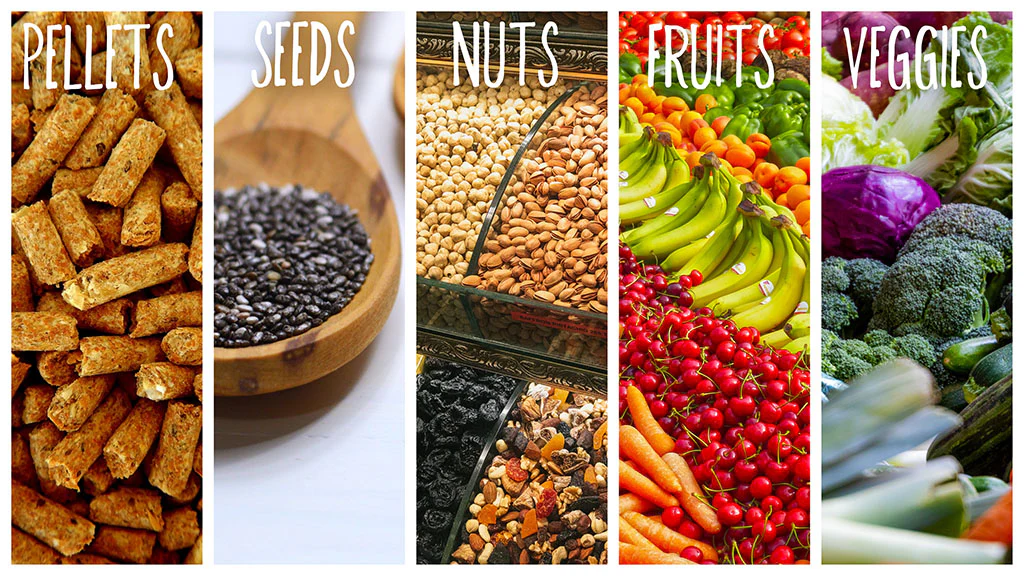
7 Healthy Treats For Parakeets And Parrots
Keeping parrots and parakeets as pets is fun and engaging . Their adorable personalities and quick wit make them very lovable. Also, the fact that they can live for a longer time than most four legged animals endears them to the heart even more. However, one of the things that can cut short the life span of these amiable little creatures is poor diet.
For this reason, it is important that as pet owners we know as much as we can about our little friends, their eating habits and what they should abstain from. Treats are those little things we give to our pets to appreciate their effort or celebrate their growth. You know how we promise gifts to our children if they perform well in school? Yeah, treats are the same things for these little guys. Parrots and parakeets alike appreciate these treats. In this article, we consider some of the best treats for parakeets and parrots.
Jump To Section
Why Should I Give My Parrot Treats?
The first question you may ask, is why treating your bird is necessary in the first place? There are numerous reasons why your parrot or parakeet should be given treats. Some of these reasons include:
- To motivate them during training sessions
- To foster bonding
- To help them associate you with a positive experience
Let’s consider these in some detail.
To Motivate Them During Training Sessions
Just like human beings and other pets, parrots are motivated by rewards. Tasks such as learning commands, learning tricks, and basic means of communication can be exhausting for parrots and parakeets. To make the exercise more rewarding, you can add some parrot treats to the training menu. What this means is that you can offer a treat each time your bird manages to do as commanded.
Going the extra mile, you can use a dedicated container to put treats for your parrot. Thus, once your parrot sees the container, it gets excited at the prospect of a treat following the training exercise. This excitement transfers into motivation to get done with the training tasks as soon as possible in order to enjoy the treats hidden in the container. Using this method, training your parrot can become a joy for both you and the parrot.
Also, through this, you will learn about your parrot’s favorite treats as well as give the parrot something to look forward to during each training session.
To Foster Bonding
Giving your parrot treats can also help to create a stronger bond between you and your pet. With the help of treats plus other positive interaction experiences, your parrot will see you less of a scary human, and more like a friend.
In addition to training routines and giving treats as rewards, some times, your parrot or parakeet may just want to rest on your shoulder quietly while it is outside its cage. No commands, no lessons, just enjoying the great outdoor. Such bonding exercises can be improved with the help of parrot treats.
So, the next time you are walking with your parrot or sitting and staring out the window together, sneak a treat under its beak, and it will look forward to your next hang out together!
To Help Them Associate you with a Positive Experience
This is true especially of baby parrots and parakeets, as well as new family additions. Because parrots are prey animals, it takes time for them to trust a human when they have moved into a new environment.
To overcome this, you can hide a little treat in your hands when you come to see your parrot. Once you know your parrot’s favorite treat, bring a little of it on your little visits. Wrap it in your folded hand, and extend your hand to the little guy. Soon, the shy little parrot will associate your hand not with danger, but delicious food.
That way, you would have broken down the walls of fear hindering your parrot, and you would be on your way to having a very positive experience with your pet, all thanks to the awesome power of treats.
When To Give Your Parrot Treats
Once you understand why you should give your parrots and parakeets treats, the next important question is when to give them a treat. Should you, in your show of love, give out treats at the slightest opportunity? Or should they be given sparsely every once in a while?
The first thing to note on when to give your parrot treats, is that it should be after it has had its nutritional meal. Usually pellets are given as regular meals because of the balanced diet they present. Remember treats are not the main meal of the day, and so they should not be the first thing you give to your parrot or parakeet. If you do, your pet may get filled on treats and neglect to eat the other healthy food meant for its nutritional benefits.
After your parrot has had its healthy balanced meal for the day, you can provide it with treats during training. Parrot training treats make the training exercise a lot of fun for the parrot. With something to look forward to at the end of training, your parrot may even exceed your expectation and surprise you during training. Even with my own birds, once they realize I am holding on to the treats box, they start to do various tricks without any command, simply because they couldn’t wait to get the treats!
In this video of four lovebirds, you can tell they are so excited and motivated by the treats that they looped the hoops onto the pole even without command! The owner almost couldn’t keep up with rewarding them as they are so quick!
Aside from training, you can give your parrot treats as a reward for cooperation. Did it obey a command it was not used to? Or behave like a very good bird at the vet’s place? A parrot treat might just be the positive reward to enforce more of that behavior from your parrot.
It is important, though, that you time the treating very carefully. For instance, if you were planning to give your bird a treat after it obeyed the “turn around” command, you need to give the treat immediately after it has completed turning around. If you only begin to search for the treat and offer it to the bird after a period of time, the bird might have done something else (e.g. squawked) in between, and it might misinterpret that you are rewarding the squawking instead of the turning around.
How To Choose Training Treats For Parrots
Just like other birds and species of animals, choosing a training treat for a parrot or parakeet is not as straightforward as it sounds. There are a lot of things to consider. Each parrot is an individual, just like us humans, and has individual preferences. What one parrot likes most, might not be another parrot’s favorite food.
When choosing training treats for parrots, you should consider what your specific parrot likes the most. To discover this, you can line up a few types of treats in front of your parrot and allow it choose. There is certainly going to be an order of priority. Perhaps it will go for the well chopped apples before it goes to the grapes, or perhaps even nuts first. Which ever way it does, note its order of priority.
With the order of priority, you can know what training treat to use for what training. With simple tasks, you can use treats that are its second or third best, while for hard tasks, you can pull out the treat it loves the most.
Also, while choosing training treats for parrots, you should consider the size of your parrot. A grain of millet may be a great treat for a parrotlet, but a macaw will not find such a treat satisfying.
In choosing training treats for parakeets, it is important to keep the sugary fruits on the down side. Parakeets can easily get hooked on sugar and may consequently begin to reject other food and fruits. For captive birds, high sugar diets are not encouraged as well, since it could lead to health issues. As such, in choosing treats for your parakeets, you should be careful of the sugar content of the treat in question.
What Do Parrots And Parakeets Like For Treats?
With parrots and parakeets, there are a wide variety of fruits and foodstuff to pick for treats. In this section, we consider some of the fruits and foods that can be given to parrots and parakeets as treats.

Nuts

Many parrots and parakeets have a special love for nuts. As such, nuts make for very good parrot training treats. Nuts have a high amount of protein contained in them and may provide good dietary content. However, they are also very high in fats. Giving nuts to your pet should be at a ratio dependent on the activity of the parrot or parakeet.
Due to the high fat level of nuts, it is not advisable to give more than a few nuts at a go. The only exception is if you have a hyacinth macaw, which is a species well-equipped to handle a diet with high fat content and lots of nuts. Whatever the amount of nuts being given to the pets, it is important that the nuts be unsalted and with no added flavors and preservatives.
Although salts are not expressly bad for parrots, parrots are small birds. Salts, and consequently salted nuts have a probability to upset a parrot’s fluid balance. This can lead to thirst, dehydration, and even death. While some salts are naturally found in food, we should always avoid giving them food with added salt. It’s all about the dose!
Some ideas of good nuts you can give your parrot and parakeet as treats include: Almonds; cashews; pecans; walnuts; pistachios; hazelnuts and macadamias. Peanuts may also be given, but with a note: raw peanuts sometimes have aflatoxins in them, which is detrimental to your parrot’s health.
Nuts can be used as special treats for parrots and parakeets. These birds also see them as foraging toys, especially when they encounter a tough nut to crack! Consequently, in addition to serving as treats, nuts can serve the dual function of providing exercise for the beaks and jaw muscles of parrots, and keeping their beaks groomed and functional.
Fruits

Fruits are very nutritional and as such serve as a good treat for parrots and parakeets. Fruits should always be presented in their natural (or even better, organic) form to parrots. The high content of vitamins in fruits, together with their mild sugar makes them a powerful favorite of parrots and parakeets alike for treats. While the pets may not know of the healthy benefits of fruits, they understand it’s juicy taste.
Examples of parakeet and parrot fruits treats include: apples, grapes, mango, banana, passion fruit, papaya and peaches. In some cases, dried or dehydrated fruits can also be offered to your birds, but like nuts, they should not contain added salt, sugar, or preservatives.
Although fruits are very beneficial to parrots and parakeets, certain fruits are dangerous to them. One of such fruits which should never be given to your parrot or parakeet is the avocado. This is because avocado is toxic to parrots. Its persin content can cause damage to the heart, respiratory difficulties and weakness. Ingestion of avocado by parrots sometimes results in sudden death of the bird. Again, this is all about the dose as well – if your parrot accidentally nibbles on a tiny piece of avocado, it might not be too severely affected (check with a vet anyway, to be sure). In any case, we should keep avocados far away from them!
Pasta

Another interesting treat for parrots and parakeets is pasta. Pasta serves as a very good training treat for parrots and parakeets. It is very high in carbohydrates and gives your bird the needed energy to engage in some of the training exercises you have planned for it.
Interestingly, parrots love pasta in all its forms. Whether raw or boiled, your parrot will not turn down an offering of pasta. You can boil some pasta and serve as a treat to your parakeet after it has cooled down, or you can present it raw, especially if your bird has a liking for the crunchy stuff.
Although pasta is a good treat, it is not the best dietary provision for your parrot and parakeet. This is because while it contains a lot of carbs, it is low in other nutrients which are necessary for the continuous growth of your pet. As such, pasta should not be used as a consistent meal, instead it can serve as an occasional treat.
Remember, as much as you want to treat your bird to the good stuff, you want to keep them healthy too!
Seeds
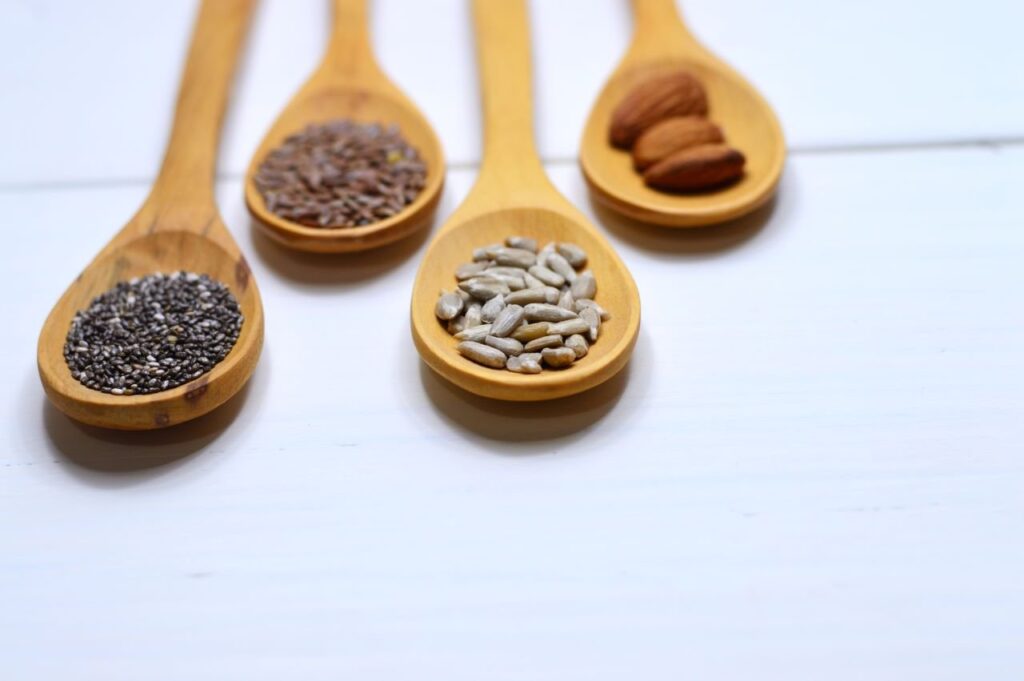
In their natural habitat, parrots and parakeets are seed eaters. This accounts for the unique love these birds have for this particular treat. In certain instances, the love for seeds develops into an obsession, and the birds no longer desire any other food aside from seeds.
Seeds provide healthy exercise for parrots as the birds must remove the hulls with their beaks before they can feast on the seed within. Engaging in this activity in a tray in their cage, the birds even get the impression that they are back in their natural habitat, eating in the wild.
However, consumed in excess, seeds also have the potential to endanger the life of the precious little pets. Seeds are low in vitamins and have high fat contents. Consequently, consuming an excessive amount of seeds without balancing the nutrient content of the diet can lead to obesity, vitamin deficiencies and eventually, death.
Healthy seeds for parrots and parakeets include watermelon seeds, millet, sunflower seeds and chia seeds.
Popcorn
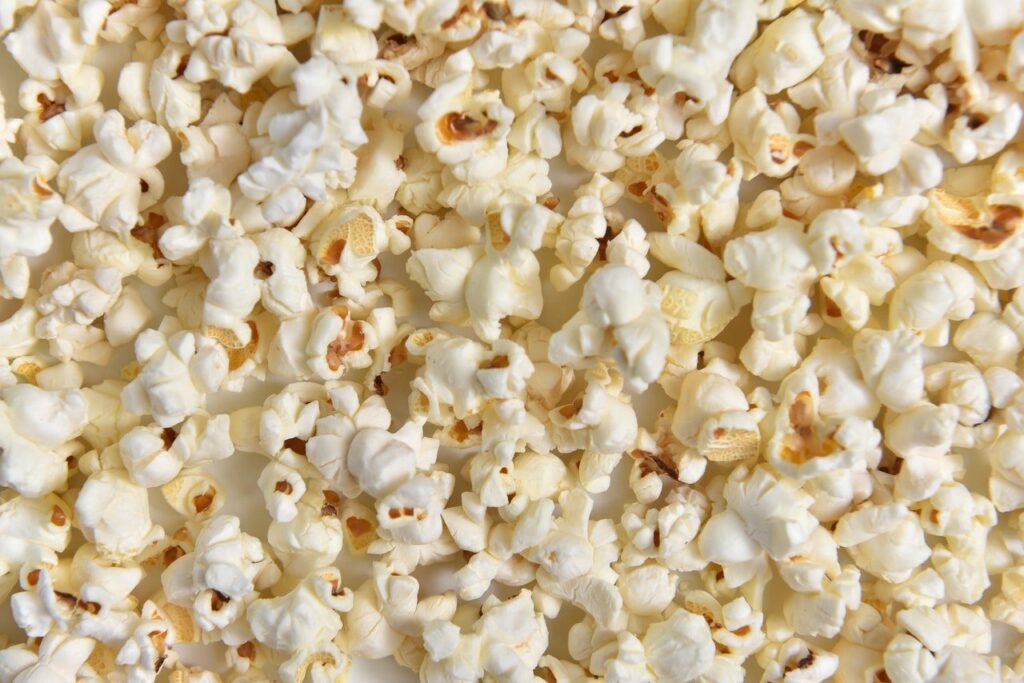
Yeah, you guessed right! Parrots and parakeets love popcorn. Consequently, it can serve as a good reward at the end of a training session. Although it does not rank as a favorite treat for parrots, it still qualifies as a good alternative to a favorite.
Interestingly, parrots like both the popped and the unpopped kernels. However, if you intend to serve your parrot with a tray of unpopped kernels, it would be best to boil it a bit in water in order to soften the hulls for the beaks of the birds.
While these kernels are rich in fiber, they are lacking in a host of other nutrients. Thus popcorn cannot make the bulk of your parrot’s diet. It is only good as a treat. Also, keep microwaved popcorn away from your parrots and parakeets. This type of popcorn is usually high in sugar and salts and as we know, neither on its own is good for our pets. Together, they can even be much worse.
Bread

Small pieces of bread can occasionally be served as a treat to parrots and parakeets. However, there are quite a number of rules that accompany giving bread as a treat to your pet.
Firstly, and most importantly, it must be whole grain breads that are organically produced. Processed bread which is good for human consumption may have adverse effects on our little pets. This is especially because of the high sodium content of processed bread. The sodium content of processed bread has an adverse effect on the digestion of food by these little pets. Consequently, non organically produced breads should be kept away from our parrots and parakeets.
Secondly, bread can only be given sparingly. While it tastes great and may be a good source of fiber, it doesn’t really add anything else nutritionally. As such, a predominantly bread filled diet would be an invitation to health complications in our pets ranging from vitamin deficiencies to obesity.
Before giving a bread treat to your parrot, soaking it in water is advisable. The water makes it easier for the parrot to digest the bread without gaining any complications from the treat given.
Grains And Cereals

Ever heard a farmer complaining about pest birds? Usually, such birds visit grain farms and feast on the grains there. This just shows how much birds generally love grains and cereals.
Like their counterparts in the wild, parrots and parakeets have a strong affinity towards grains and cereals. Whole grains provide a very good source of both proteins and carbohydrates and as such, make a very good nutritional addition to your pets diets. As treats, these nutritional favorites serve both the function of boosting the health and providing the pleasure sought in treats.
However, while cereals are a potential favorite treat for parrots and parakeets, they should be given with caution. Cereals with artificial flavors, added sugars and the likes should be kept far away from parrots. They have a high potential to cause damage to the health of these pets.
What Treats Do We Use For Our Own Parrots?
In taking care of our own parrots and parakeets, we make use of uncooked organic buckwheat pasta which is a much healthier version of pasta than the usual wheat-based pasta. This is because buckwheat provides a lot of healthy advantages over wheat-based pasta.
First off, buckwheat is gluten free. This makes it a viable alternative to wheat pasta. They are also lower in calories and carbs when compared with other types of pasta like wheat-based pasta. Finally, buckwheat is considered a superfood with nutrient rich capabilities that help boost health. Consequently, it is said to improve cardiovascular and digestive health while reducing chances of having life threatening diseases like diabetes.
Also, we use the fusilli type of buckwheat pasta which is a lot easier and more convenient to snap into small beak-sized pieces to offer to our parrots as treats. The only inconvenience we manage in this regard is the difficulty in obtaining buckwheat fusilli in this region. More recently, we have switched to offering hemp seeds which seems to be extremely popular, and gets our parrots really excited, even more so than pasta!
Final Notes
As discussed above, finding and giving treats to your parrot is both an exciting and tasking experience. Pursuing the benefits of treats, it can help you discover what your pet likes and dislikes and what treats are perfect for training your parrots and parakeets.
However, you must remember at all times that treats are to be given in moderation. As seen, parrots and parakeets are like humans in a lot of ways. There is a very high tendency to fall in love with treats that are not healthy for them in the long run. As such, you must be the watchman that holds the leash on the beak of your pet in order to preserve it’s life and health for as long as possible.
Also, it is essential that you always control the giving out of treats to specific situations and conditions. Use a special bowl or container for treats, not their regular bowl. These little acts condition the mind of our pets to expect treats at certain times and not at other times. This is also an important training for your pets that will aid you as they grow.
Again, you should always ensure that your treats are fresh when being given to your parrots and parakeets. Parrots are sensitive little birds, and stale or moldy treats would not only come off as bad to them, but also has the potential to affect their health in a negative way.
In all, it is important to consider the beat interests of your pets while giving them their treats.
What treats have you been giving to your pets?
Do you think we missed out on anything?
What would you like to read more about? We would love to hear from you in the comment section! Leave a comment down below.
Parrot Junkie www.parrotjunkie.com
Copyright © 2021-2024. All rights reserved.
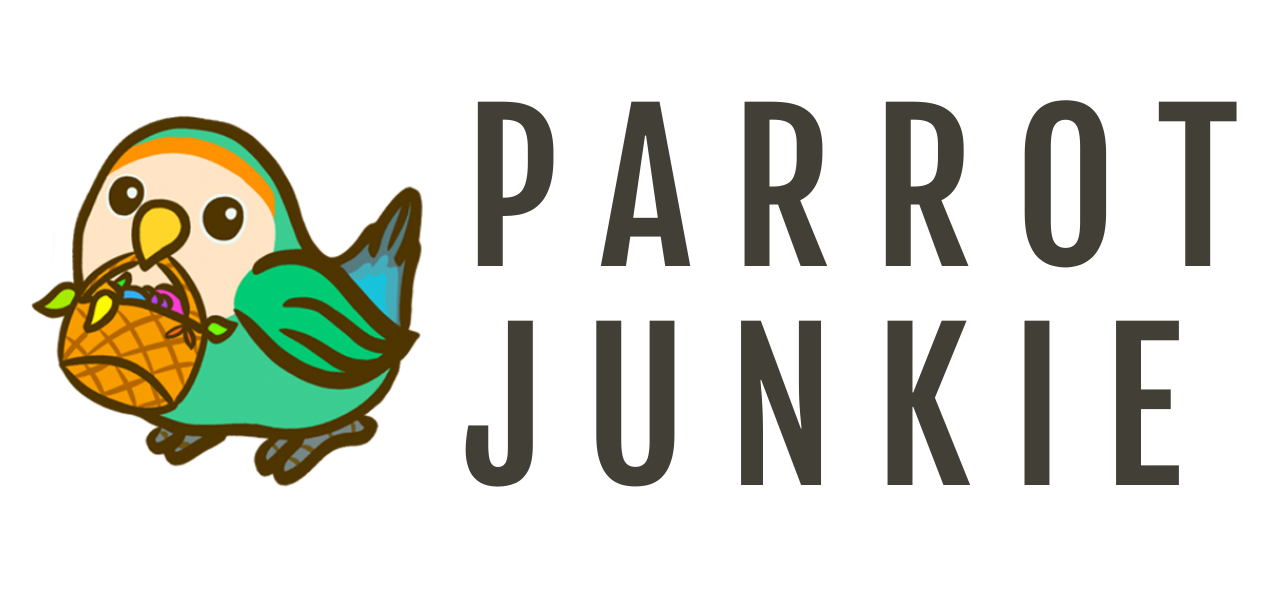
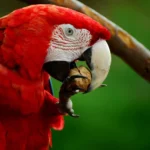
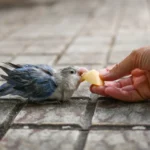
Jessie
28 August 2024
Thank you very interesting for me as I am a new parrotkeet owner.